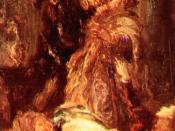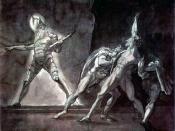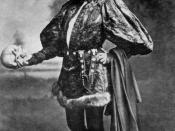William Skakespearce's Hamlet is a tragedy wich manages to capture readers and still remains among the best. Hamlet is a young sensitive man who is in a world of chaos and turmoil. Hamlet his forced to seek vengeance after his father the king, is brutally murdered by his brother and is also forced to find himself. Hamlet goes through rough times which call for desperate measures which he is unable to make. Hamlet's major flaw is his inability to act properly during crucial situations since he either over analyzes the situation, his high morality steps in, or he acts too spontaneously. Hamlet's tragic flaw is his inconsistent approach to problems. In the scenarios that may call for quick, decisive behavior, Hamlet contemplates. An instance of this is when Hamlet has his knife over the head of Claudius, prepared to murdered him, and he talks himself out of it. This clearly demonstrates that Hamlet can not take direct actions because of tendency to over analyze the matter at hand.
Another illustration of this is the play put on by Hamlet in which he wants to have proof that Claudius murdered his father. Hamlet cleverly comes up with a plan to create a play in which the king is murdered by his brother. Hamlet is unable to do anything without rationalizing it to the highest point. In reality, all Hamlet needs to do is act on the ghost's words.
Furthermore, Hamlet surfers with a case of high morality in a time of much turbulence. Unlike the devious Claudius who murdered his own brother to marry the Queen and be crowed king without any remorse, Hamlet is not capable of murdering a person because his conscience immediately prevents him from carrying forward. Hamlet is one of the only characters who has expectation for others to do what is morally correct. Hamlet should have simply killed Claudius for his father's ghost to rest in peace, for Hamlets rightful place in the throne and for Justice against the horrible actions of Claudious. After all that Claudious intended to kill Hamlet without any remorse to his life. It is Hamlet's high morality which also causes him to over analyze the situation and create plans which are unrealistic and only make time pass.
On the other hand, in those scenarios that require complete examination, Hamlet is spontaneous. An example of this is seen when Hamlet hears a rotten man listening in on his conversation with his mother and suddenly kills the man behind the curtain without thoroughly thinking how it might be. Hamlet's rash decision to draw is sword winds up killing Polonius. This clearly displays how Hamlet acts unexpectedly when is caught of guard and that his senses are so heighten by the stress that it starts to clutter his thinking. An additional representation when Hamlet threatens his friends and follows the potentially dangerous ghost into the forest without any contemplation. Hamlet should have thought for a moment whether that decision was best for that situation. Hamlets friends could most likely have provided him with the support he need to confront the ghost and any other possible dangers that may result from his meeting with the ghost. Instead, Hamlet is left all alone to face the ghost and is also the only one responsible for carrying out the vengeance that the ghost seeks. Hamlet's ability to over analyze matters fails to kick in on the times when rational thinking is most necessary.
In conclusion, Hamlet's tragic flaw is neither external difficulties nor his motivation by ambition. Because of his inconsistent approach to problem solving, Hamlet is responsible for his own downfall. Hamlet goes through rough times which call for desperate measures which he is unable to make. Hamlet's major flaw is his inability to act properly a crucial situation since he either over analyzes a situation, his high morality steps in, or he acts too spontaneously.





